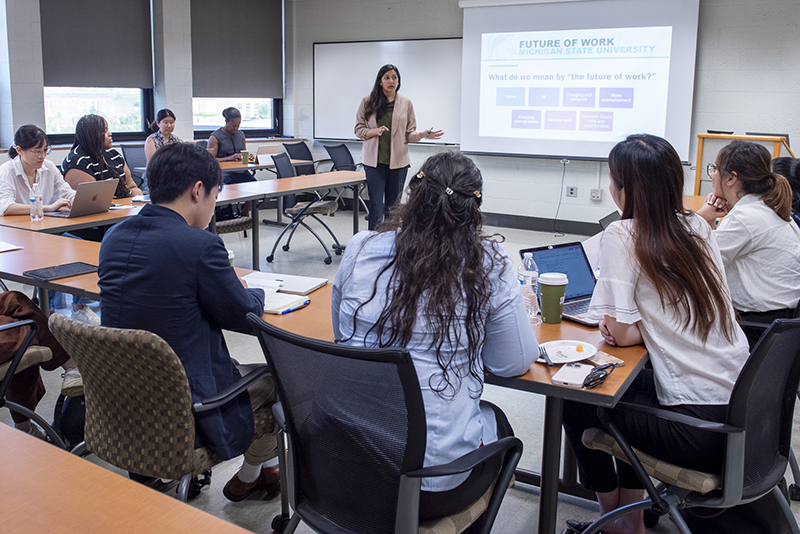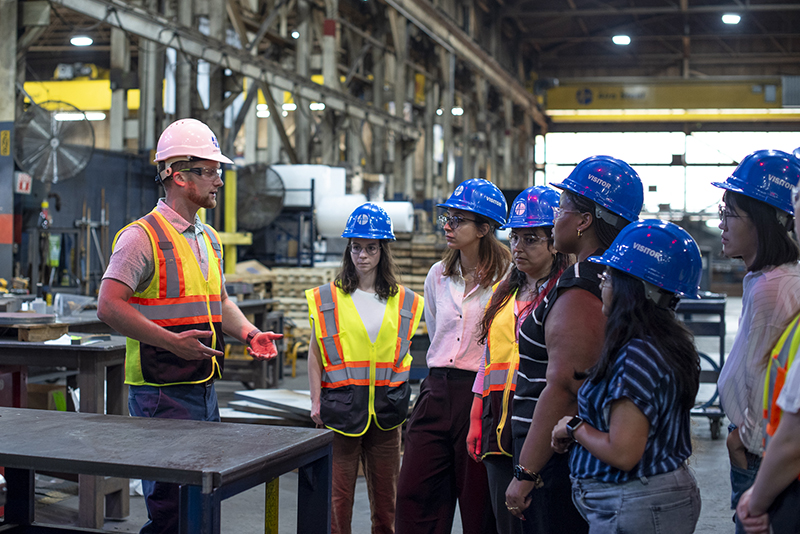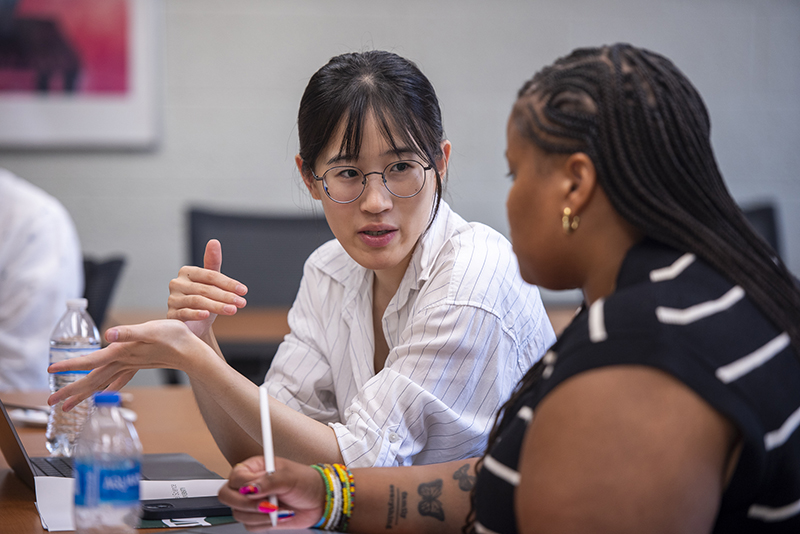MSU Future of Work Initiative Brings Together Spartan Faculty and Students from Across the Country for Summer Research Incubator
August 6, 2024 - Emily Jodway

The Future of Work Initiative hosted a Summer Research Incubator, bringing Graduate and Doctoral students from across the globe to work with our world-class faculty. Photo credit: Jacqueline Hawthorne, MSU.
The MSU Future of Work (FOW) Initiative hosted graduate and doctoral students from across the country for its first-ever Summer Research Incubator, giving them the opportunity to collaborate, share ideas with and learn from MSU’s world-class faculty and researchers.
Housed within the College of Social Science but spanning across multiple disciplines on campus, the Future of Work Initiative seeks to assess how new and emerging technologies affect a wide variety of groups and outcomes and evaluate how organizational strategies can best ensure inclusiveness and improve workers’ lives.
The week-long Incubator saw 12 students join together for a series of group discussions, Q&A panels with faculty and other experts, one-on-one faculty mentoring sessions, and tours of several local laboratories, all culminating in a celebration of the week’s achievements on Friday. Tara Behrend, a John R. Butler II Distinguished Professor in Human Resources and Labor Relations and Director of the FOW Initiative, along with professors Daisy Chang and Quinetta Roberson, first discussed the idea for the Incubator last October and were able to see their plans come to fruition in just under a year.
The week began with a pair of group discussions and expert panels, followed by site visits to Ionetix and Alro Steel, two manufacturing plants located in Lansing. The FoW partnered with Cindy Kangas from the Capital Area Manufacturing Council to arrange these site tours. On Tuesday, the group came together for a literature review workshop with Dr. Ann Marie Ryan, a trip to Haptix media studios and a panel discussion on asking inclusive research questions with Drs. Angela Hall and Philip DeOrentiis (HRLR), and Sriram Narayanan (supply chain management).

The Future of Work initiative hosted a Summer Research Incubator, bringing Graduate and Doctoral students from across the globe to work with our world-class faculty. The group had a tour at Alro Steel factory, Lansing. Photo credit: Jacqueline Hawthorne, MSU.
The group talked with the visiting students about how to include diverse research questions and samples in their studies, and the benefit of getting perspectives from underrepresented groups. Hall, who is a first generation graduate and afro-latina, is particularly passionate about having representative samples and is proud of the unique lens that she can bring to the table. She also emphasized the importance of developing relationships with organizations like the NAACP, the urban league, and tribal groups that can give you access to diverse groups of people for studies.
“Be inclusive as a researcher, don’t just do inclusive research,” DiOrentiis said. “To get these samples, it takes effort to reach out to these people. It can be a bigger burden to people that do research this way, but don’t let the difficulty deter you; remember you’re doing this research because it motivates you and you’re passionate about it.”
On Wednesday, the group attended panels with Chris Nye and Kevin Hoff from the psychology department, focused on advanced technical writing and research design. On Thursday, the group convened for another panel, this time on managing research collaborations. Drs. Dorothy Carter from the Broad College of Business, along with Hye Jin Rho from HRLR and Bill Chopik from psychology, gave personal insight on finding and maintaining good relationships with fellow researchers and fostering collaborations.
Rho discussed how early on in her career, she worked to find other groups with similar interests and established relationships with other young researchers by attending conferences and meeting others in the field. “It’s through these small conversations and chats that different ideas emerge, and you can start to think about research or writing a grant together,” she explained.
For Chopik, one of his biggest hurdles early on was getting used to cold-emailing colleagues. “Sometimes the first step is an email,” he said. “I had to work on getting past the thought that I was bothering people; I thought about how I would react if I got an email from someone wanting to collaborate with me. Articulating exactly what you want to do, being a nice person, being generous and explaining how it would also benefit them all helps too.”
Their other biggest piece of advice was proper communication. “It’s important to set expectations clearly from the onset,” Rho said. Chopik added, “The most pitfalls come from not communicating. It’s rare that problems in collaboration emerge any other way. It can come with some discomfort early on, but it’s usually smooth sailing the rest of the way. Just be super up-front.”
Chopik was thrilled to be invited to the panel discussion and praised the work that MSU faculty is doing within the Future of Work Initiative. “Our hope was to provide a professional development opportunity to junior scholars so that they can get the most out of their collaborations moving forward,” he said. “MSU has historically been a powerhouse for work-related scholarship and business engagement. The Future of Work Initiative has been so wonderful in highlighting that expertise, energizing collaborations, and helping shape the next generation of Future of Work Scholars!”

The Future of Work initiative hosted a Summer Research Incubator, bringing Graduate and Doctoral students from across the globe to work with our world-class faculty. Photo credit: Jacqueline Hawthorne, MSU.
The week came to a close with more workshops, a recognition ceremony, and words closing words from a keynote speaker, Dr. Mitchell Stevens. Stevens is an organizational sociologist at Stanford and Director of the Stanford Pathways Lab as well as Co-Director of the Stanford Center on Longevity. He gave the students another unique perspective on the future of work and higher education, and encouraged them to always “keep working that muscle of building relationships with people.”
After a research paper workshop with Dr. Quinetta Roberson, a professor dually appointed in the psychology department and the College of Business, each student was individually recognized for participating in the Incubator and being part of its inaugural cohort. They were also each given the opportunity to speak on their experience and what they hope to bring back to their own research and institutions.
“This experience was so rejuvenating,” said Shelby Davis, a second-year PhD student at Colorado State. “Being in this space around like-minded people made me feel like I can go back to school and get into that researcher headspace and the goals that I’ve set out to do.”
Jasmine Hujie Shi was a member of the cohort already studying at MSU, as a doctoral candidate in HRLR. She still felt that she received a lot of helpful, new advice and enjoyed getting to talk with students from other institutions.
“I’ve taken classes with many of the [faculty] here already, but I still learned many new interesting perspectives,” she said. “Touring the site labs was cool, so was getting to make connections with other doctoral students from other schools, potentially being able to work with them in the future.”
“I didn’t really know what to expect when I came here, but I saw a plethora of research interests, and faculty from all levels were welcoming and treated us as equals, which is huge as a graduate student,” said Horatio Taylor, a fourth-year PhD candidate at the Bauer College of Business at University of Houston. Sang Hoon Han, a student at Ohio State, added: “The mentoring opportunity was great because we could request specific professors if we wanted to talk with them. I was paired with Nick Hays and had a good information exchange with him over lunch. It was very helpful.”
Learn more about the Future of Work Initiative here.

